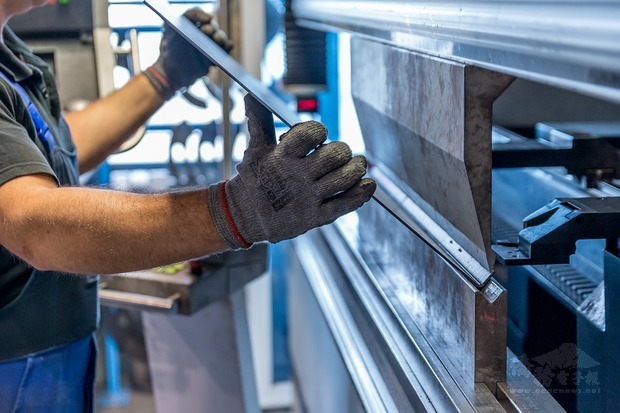
The industrial production index, which gauges changes in the actual volume of items produced rather than their value, rose 18.81 percent in January from a year earlier to 125.40, the second-highest level ever, due to a relatively low base of comparison as the Lunar New Year holiday fell in the first month of last year, which left fewer work days that month, the MOEA said.
The sub-index for the manufacturing industry, which accounts for more than 90 percent of total industrial production, gained 19.67 percent from a year earlier to 127.60, also the second-highest level ever recorded, the data showed.
On a monthly basis, the industrial production index fell 3.18 percent in January from December, with production in the manufacturing sector down 3.33 percent.
MOEA Department of Statistics Deputy Chief Huang Wei-chieh (黃偉傑) said that in the manufacturing industry, the production sub-index of the electronics component sector continued to post double-digit growth for the 14th consecutive month at 21.16 percent.
Within the category, the semiconductor production sub-index rose 24.67 percent from a year earlier in January.
That's believed to be due to increased demand for laptop computers and other electronic products by people who are forced to work or study from home as a result of lockdowns to prevent the spread of the COVID-19 disease.
Looking ahead, Huang said although the Lunar New Year holiday fell in February this year, which reduced the number of work days this month, the semiconductor sector is forecast to benefit from strong demand for chips made using high-end processes as the global economy is expected to expand, assuming widespread COVID-19 vaccine rollout throughout the year.
In addition, as the global economy is expected to gradually rebound, leaving behind the COVID-19 pandemic, the petrochemical, basic metal production and machinery sectors would gain momentum and boost productivity, according to Huang.
Meanwhile, according to the MOEA, the food and beverage industry, which is one of the hardest hit by the COVID-19 pandemic, posted a 15.3 percent decline in revenue from a year earlier to NT$70.2 billion (US$2.52 billion) in January.
Within that category, caterers saw their revenue fall 23.5 percent to NT$2.5 billion during the month, continuing to be hurt by COVID-19.
Sales posted by the beverage industry declined 5.5 percent from a year earlier to NT$8.7 billion, the data showed.
Since the pandemic began, the food and beverage industry's revenue has been on the decline, Huang noted, adding that if Taiwan can get the pandemic under control, the sector's sales are expected to return to growth in February.
In contrast, data compiled by the MOEA showed that the wholesale sector posted NT$993.6 billion in sales in January, up 23.1 percent from a year earlier and the highest ever for the month of January.
Retail sales last month totaled US$368.1 billion, the highest ever for the month of January and 3.6 percent higher than a year earlier, according to the data.